As Maria was working on Blog 4, I happened upon an article about photographer Edward Burtynksy, who is of Ukrainian descent and still has family there. He was scheduled to photograph in Ukraine this year for other reasons than the war. His work has been postponed. He said of what is happening in Ukraine and Russia, and that Maria’s blog speaks directly to, “Unbelievable, the amount of hate and trauma that’s being inflicted. [Putin]’s destroying the future of a whole generation of Russians and traumatizing the whole country of Ukraine. It’ll take generations to heal.”
Artists respond to war situations in various ways, as anyone would be. When undergoing stress and trauma caused by dislocation, loss of statehood, livelihood, physical harm and perhaps death, people are changed physically and emotionally. Overtime, personality and values are taken over by trauma responses, making living life so difficult because all trust is gone. What is happening in Ukraine and Russia is a cautionary tale for free-minded people, seeing how easy it has been for personal freedoms to be taken away by an autocratic, conservative government. Maria suggests that artists can, in spite of everything that may happen to them, find the way back again to a full embrace of life. —Clayton Campbell
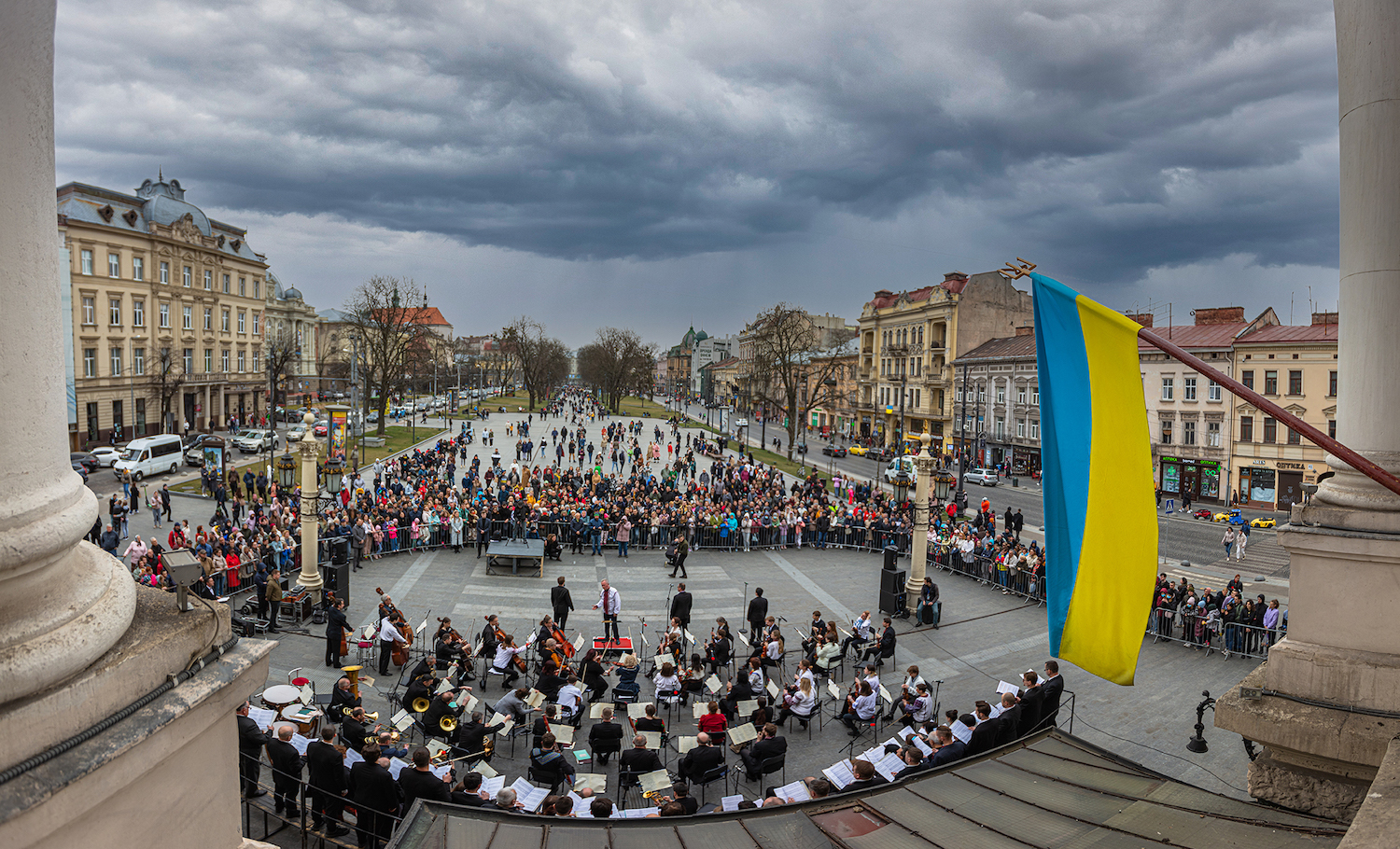
Lviv, Ukraine–March 26, 2022: Concert near Lviv National Opera. Photo: Ruslan-Lytvyn
April 15, 2022
The mission was impossible.
Since the ’90s, when the first contemporary galleries appeared in Russia, art began to actively develop and be included in the international context. After 2014, when Russia annexed Crimea, everything changed. Perhaps we created our own bubble of illusions, inflated more and more as Russian artists found success. What we thought we were building, a free-minded cultural community, did not transfer to the vast majority of Russians. They had no interest in our values and creative pursuits.
After the collapse of the Soviet Union, restrictive regulations on artmaking were canceled and for the next 20 years artists could fight for the freedom of their art without fear of punishment from the state. Integration into the global cultural space supported this illusion: that Russian art could be free. This is the era I grew up in as an artist. But another fate was prepared for us.
There was some change in those two decades. The influence of contemporary art helped to penetrate a historically unfree land. Surveys from 2021 show that at least 30% of the Russian population put freedom as their first priority and do not support repressive actions by state authorities. Yet this minority has been silenced as artists are now squeezed out of their country.
This liberal change of sensibility, especially in younger generations, threatened the government. Over the past five years censorship in Russia has returned. High-profile artists have been publicly punished. Kirill Serebrennikov, born in Ukraine, is one of the most prominent theater directors in Russia. He spoke out against the Russian annexing of Crimea. As a result, his apartment was raided shortly after. He was sentenced in June 2020 to a three-year suspended prison sentence and was also issued a fine over trumped-up charges of embezzlement. A Moscow court canceled the suspended sentence after questioning the filmmaker twice last month. The director left Russia two weeks ago and is residing in Germany.
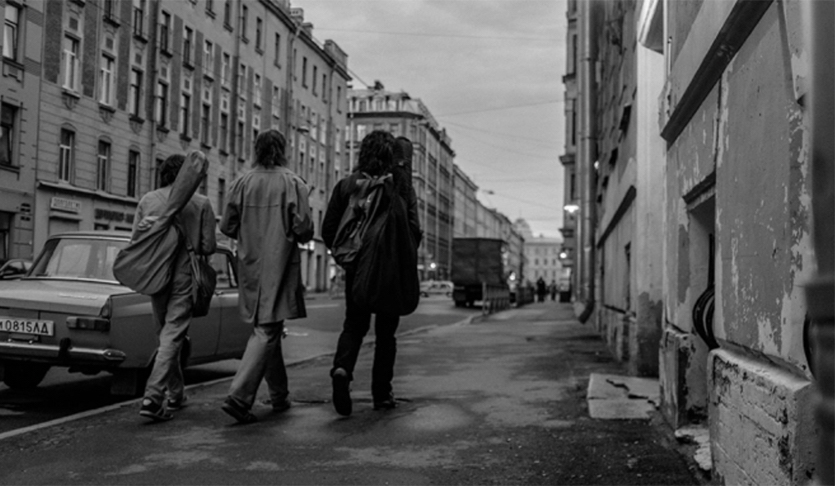
Still from the film Leto, Director Kirill Serebrennikov
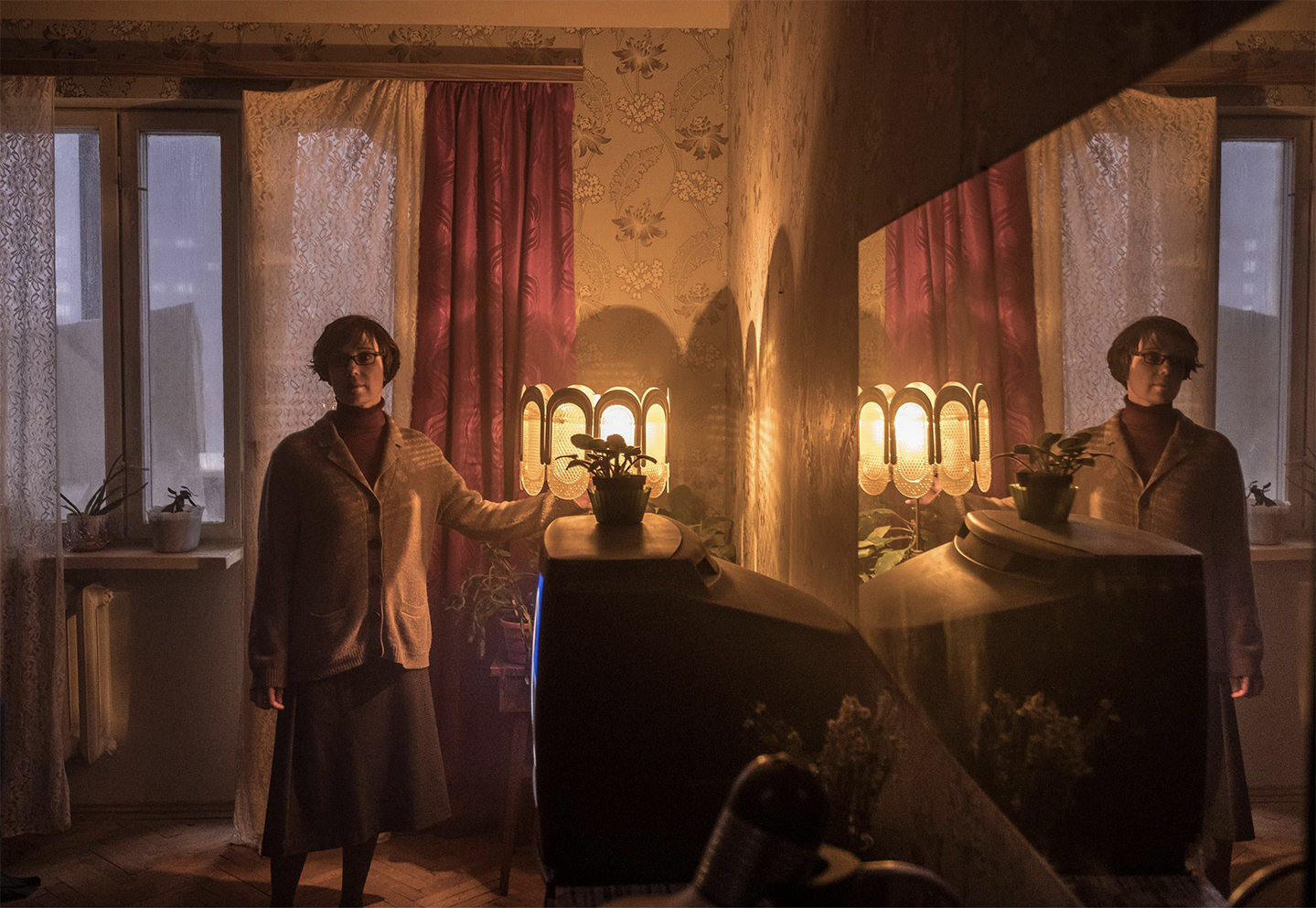
Still from the film Petrov’s Flu, Director Kirill Serebrennikov
In another example of public shaming, feminist artist and LGBTQ+ activist Yulia Tsvetkova is on trial in Russia, facing charges of disseminating pornography based on her artwork featuring the naked female body. She was arrested in November 2019 and was forced to pay two fines under Russia’s notorious “gay propaganda” law. She remained under house arrest until March 16, facing up to six years in prison if found guilty of illegally producing and distributing pornographic materials on the internet. The current case has terrible implications for the future of women’s rights in Russia, as it marks the first time an activist has faced criminal charges to produce feminist art.
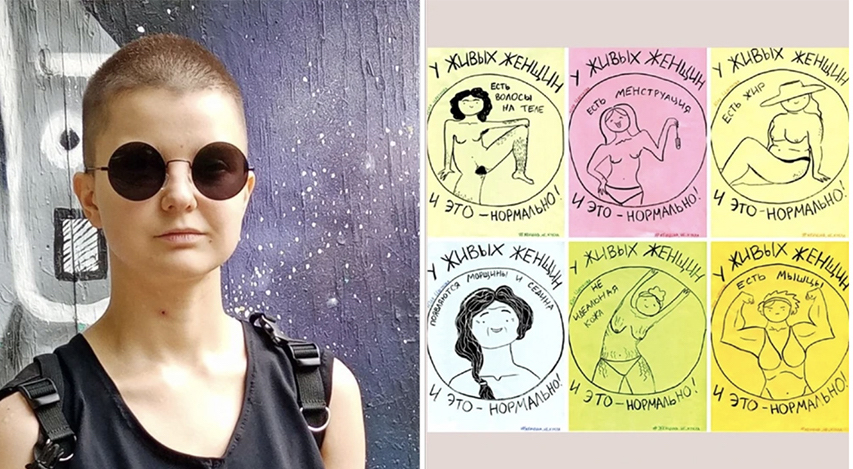
Yulia Tsvetkova and her viral body-positive drawings A Woman is Not a Doll. Photo: Anna Khodyreva
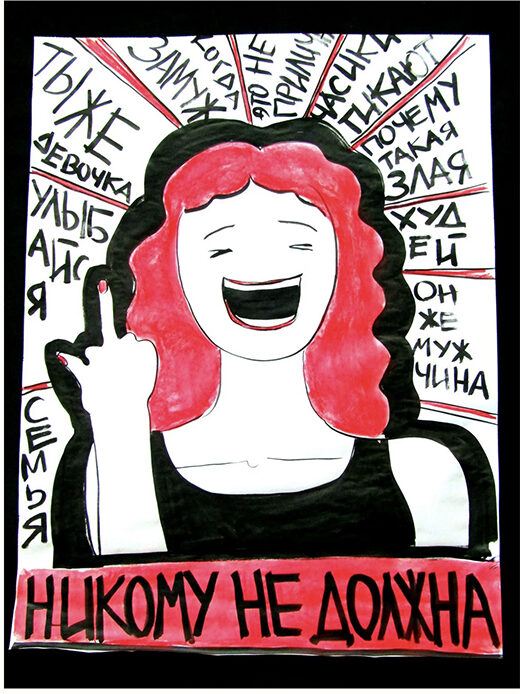
Yulia Tsvetkova, Untitled, 2018. Text in red- “You don’t owe anyone anything” Around her are comments like “smile, lose weight, family, etc.”
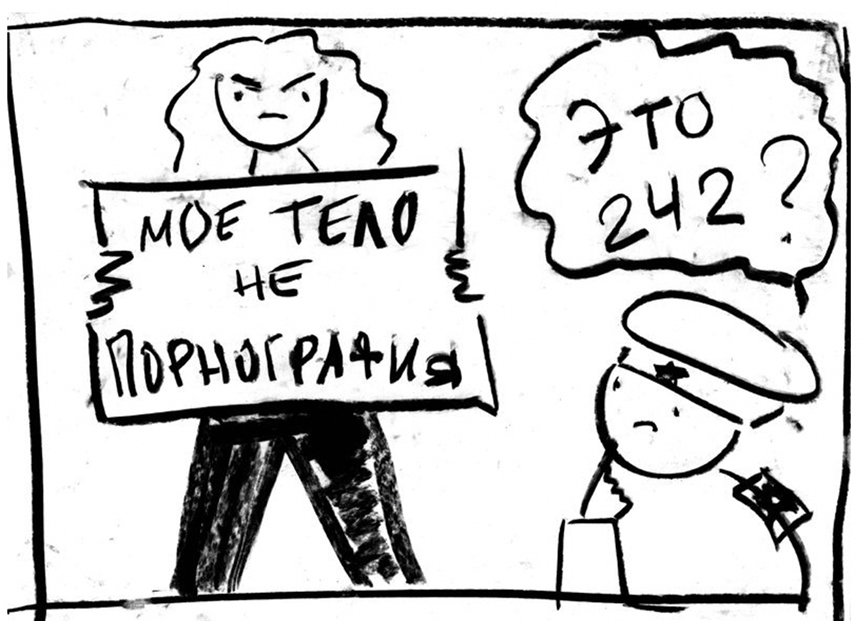
Yulia Tsvetkova, “My body is not pornography!” reads the protestors placard. “Is this an Article 242?” wonders the policeman. Article 242 of Russia’s Criminal Code criminalizes the creation and exchange of pornographic materials. Image ©: Yulia Tsvetkova
Authority of most kinds has never trusted art. Art makes it possible to think critically. People who contest various forms of power and control are uncomfortable to the status quo. We are viewed by Authority as uncontrollable. Like a mindless machine the State can only suppress, alienate or kill us.
In the supposed socialism of Russia, Dmitry Medvedev (former Russian president) recently stated that Russian culture will not close itself off from the world, but will focus on “adequately minded people”, those who share and support their position. This is about staying in power
Four years ago, when I left for Los Angeles, I was able to feel the whole abyss that still separates the contemporary art of Russia and other free countries. It has become, I fear, an unbridgeable chasm.
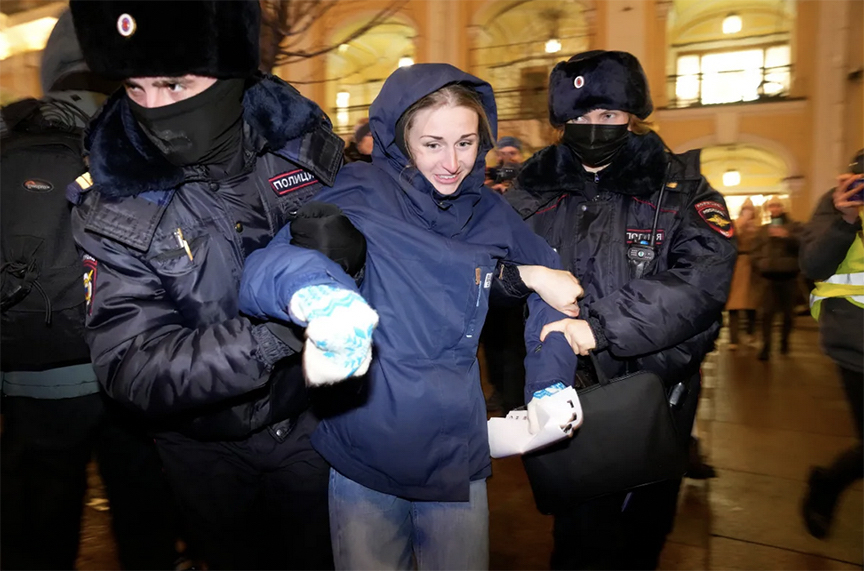
Many young people were among those out demonstrating in Russian cities. Here, a young woman in St. Petersburg is detained by officers. (Photo: Dmitri Lovetsky/The Associated Press)
The liberal change of sensibility in the last 20 years, especially in younger generations, threatens the government. I can definitely say that the generation of my daughter, who is now 16 years old, is completely different. They have a sense of empathy, lack of fear, and think freely. More than 400 teenagers were detained in Moscow in February and March at anti-war rallies. As a result, on February 24, 19 protocols were drawn up to punish a perceived failure by parents to fulfill their obligations to raise minors, due to the participation of children in rallies. They include fines and possible deprivation of parental rights in case of repeated detention.
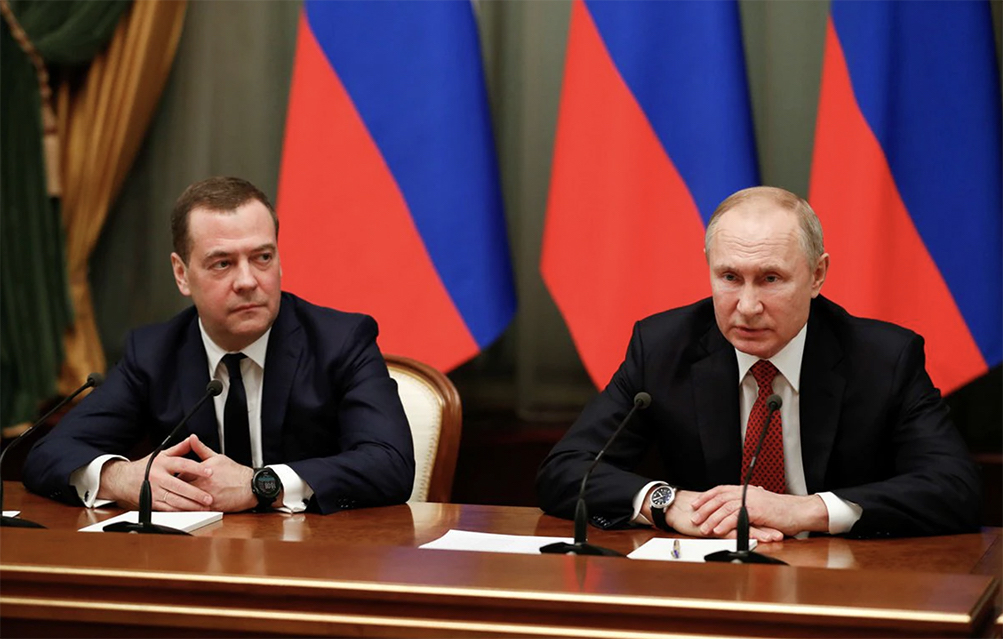
Russian President Vladimir Putin and Dmitry Medvedev attend a meeting with members of the government in Moscow, Russia January 15, 2020. Sputnik/Dmitry Astakhov/Pool via REUTERS/File Photo. They warned the United States on Wednesday that the world could spiral towards a nuclear dystopia if Washington pressed on with what the Kremlin casts as a long-term plot to destroy Russia.
It is beginning to seem that the war will continue for a long time; the wreckage of Ukrainian museums and concert halls will smoke in ruins for more years; the Russian cultural spaces supporting truly free art will return not soon. Russian President Putin recently spoke live on Russian TV and voiced a phrase popular in his circles: “The war between Russia and the United States will continue until the last Ukrainian.”
It’s hard for me to imagine now how artists will come out of this meat grinder. It may only be possible to truly talk about this only after the end of the shooting. What Ukrainian and Russian artists are now experiencing will sooner or later be embodied in their work. This will be a whole stage in the global cultural agenda. And it shouldn’t be lost, blurry. This should be accepted, comprehended as part of a new culture, even more free!
It seems to me that most artists I am meeting and hearing from have quickly developed a different attitude to their work. I am rethinking my past work and the topics covered. There is a greater sense of responsibility. The topics of ecology, gender issues, our future, have not lost their relevance, but now my focus has shifted, everything becoming much sharper and more subtle.
I invite other artists to share with me what they are experiencing today and I will publish it on my blog.
—Maria Agureeva
Editor’s Note: If you would like to donate to Ukrainian relief efforts, you may make a direct contribution to the Global Giving Ukrainian Relief Fund at this link. Or please donate to a charity of your choice that will assist the people of Ukraine.
https://www.globalgiving.org/projects/ukraine-crisis-relief-fund/

